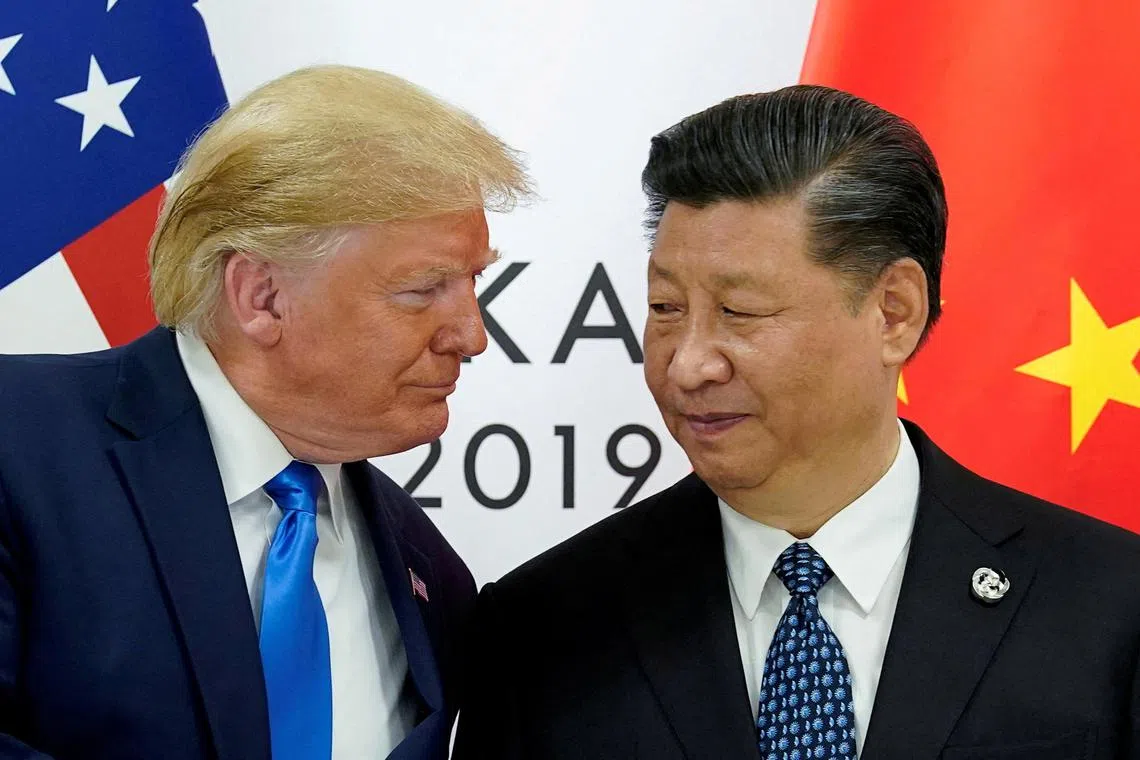Trump says he will impose 10% tariffs on Chinese imports on Feb 1
Sign up now: Get ST's newsletters delivered to your inbox

Mr Trump said that the tariffs were in response to China’s role in America’s fentanyl crisis.
PHOTO: REUTERS
Alan Rappeport
Follow topic:
WASHINGTON – US President Donald Trump said Jan 21 that he intended to impose a 10 per cent tariff on Chinese imports into the United States on Feb 1, a decision that is sure to escalate trade tensions between the world’s largest economies.
Speaking at the White House, Mr Trump said that the tariffs were in response to China’s role in America’s fentanyl crisis
The tariff threat comes after Mr Trump said Jan 20 that he planned to impose a 25 per cent duty on imports from Canada and Mexico as punishment for allowing fentanyl
“We’re talking about a tariff of 10 per cent on China based on the fact that they’re sending fentanyl to Mexico and Canada,” Mr Trump said.
Those tariffs would come on top of levies that Mr Trump imposed on more than US$300 billion (S$406 billion) worth of Chinese imports during his first term. Those tariffs were kept in place by President Joe Biden, who imposed additional levies on Chinese electric vehicles, solar cells, semiconductors and advanced batteries.
Mr Trump’s pledge to hit China, Canada and Mexico with tariffs is expected to result in retaliatory action against US industries. Economists have warned that a global trade war could cause inflation to rebound and blunt US economic growth.
Mr Trump signed an executive order on Jan 20 directing various agencies to study a wide variety of trade issues with an eye towards future tariffs, but he did not impose any new levies immediately, as he had previously threatened.
Instead, he ordered US officials to examine flows of migrants and drugs from Canada, China and Mexico to the United States, and the compliance of those three countries and others with their existing trade agreements with the United States.
China said on Jan 22 it was willing to maintain communication with the US to “properly handle differences and expand mutually beneficial cooperation”. It sought to promote stable and sustainable ties with the US, the foreign ministry said.
“We always believe that there is no winner in a trade war or tariff war. China will always firmly safeguard its national interests,” ministry spokesperson Mao Ning told reporters at a regular press briefing.
Mr Trump negotiated a new trade deal with Canada and Mexico during his first term: the United States-Mexico-Canada Agreement, or USMCA. He also agreed to a limited trade pact with China that was supposed to reward American farmers.
He has since said that he wants to rewrite both agreements during his second term.
Mr Trump and Mr Xi Jinping, China’s President, spoke last week
After Mr Trump’s tariff action against China in his first term, he signed on to a broad economic agreement in 2020.
Relations between the countries unravelled during the Covid-19 pandemic, which Mr Trump blamed on China, and Beijing failed to live up to many of its agreements in the deal, including to purchase American farm products.
Mr Scott Bessent, Mr Trump’s pick to be Treasury secretary, said during his confirmation hearing last week that he planned to press his Chinese counterparts to start buying US farm products as their government had promised.
The Treasury nominee also said that he would press his Chinese counterparts to purchase additional products to make up for what the country was supposed to buy over the last four years. NYTIMES
Additional reporting by Reuters

